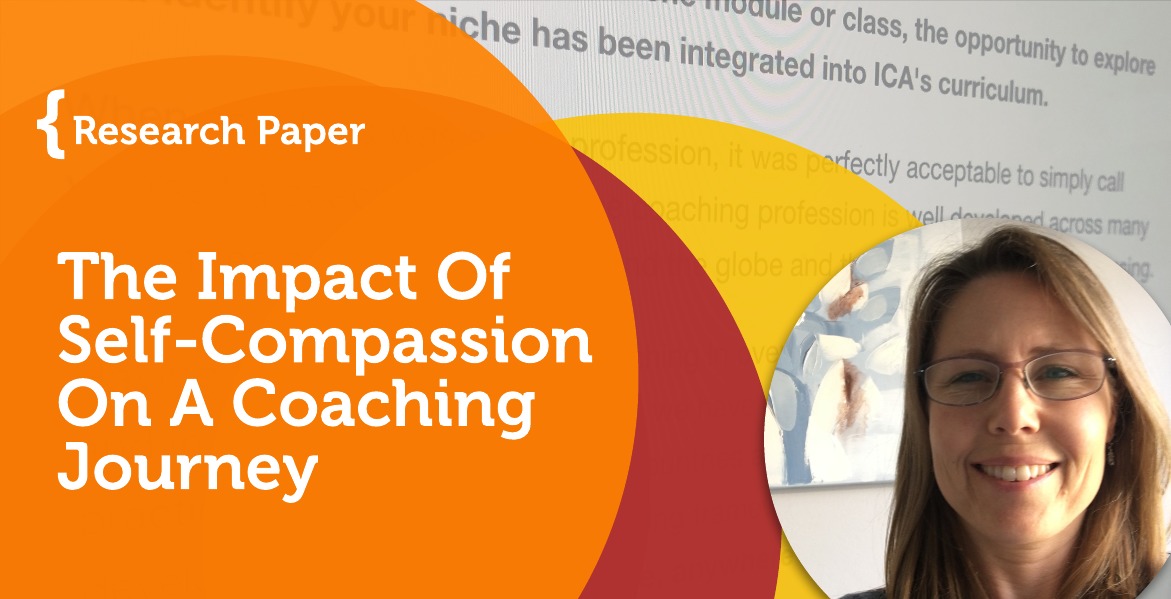 Research Paper By Gretel Lampe
Research Paper By Gretel Lampe
(Executive Coach, UNITED STATES)
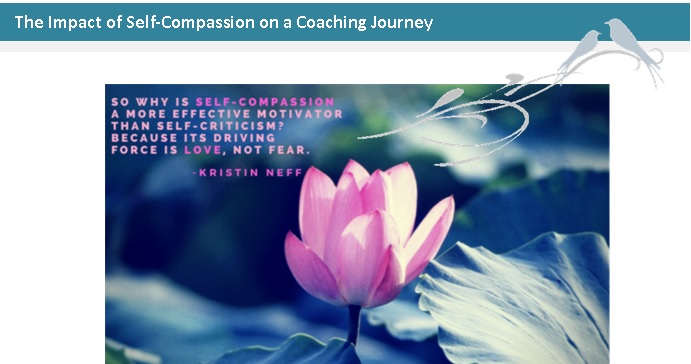 Introduction
Introduction
Embarking on a coaching journey means being intentional about discovering and exploring our uniqueness, forever holding the question “Who am I?” with a spirit of love, curiosity, and openness.
A coaching journey is one of growth in self-awareness, in other(s)-awareness and awareness of the world around us. The journey supports us as we explore how best we can serve at the intersection of ourselves, of others, and of what life brings, with the confidence to “know who I am” and the courage to “be who I am” always.
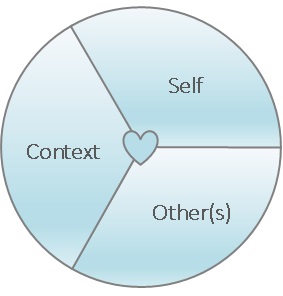 A big part of this journey of growing in knowledge and understanding of ourselves is discovering our natural patterns of thinking, feeling, and behaving. As important, is to gain awareness of the patterns that are not so natural or comfortable for us, but to thrive we must invest in the growth of our natural talents. Embarking on a coaching journey focused on what is right about us, presents an opportunity to discover a bountiful source of energy that is natural and sustainable.
A big part of this journey of growing in knowledge and understanding of ourselves is discovering our natural patterns of thinking, feeling, and behaving. As important, is to gain awareness of the patterns that are not so natural or comfortable for us, but to thrive we must invest in the growth of our natural talents. Embarking on a coaching journey focused on what is right about us, presents an opportunity to discover a bountiful source of energy that is natural and sustainable.
Sometimes, however, access to this path of thinking and exploring is blocked – either through self-criticism, self-doubt or for so many possible reasons, a lack of self-belief – each of which has the power to make us feel stuck. Research has shown that practicing compassion and more specifically self-compassion have the ability to unblock these barriers and allows us to find flow in our lives and experience a sense of fulfillment by reducing our fear, anxiety, and stress.
Compassion
The word “compassion” comes from Latin and Greek and means “to suffer with.”
Compassion is a concern for the well-being of others and is about noticing someone’s struggle and looking for ways to alleviate their suffering. An act of compassion can be defined by its helpfulness, with qualities such as patience and wisdom; kindness and perseverance; warmth and resolve.
Brené Brown defines compassion as a belief system that we commit to about how we treat ourselves and other people. Interestingly, her research on compassion shows that the one thing all those that scored high in compassion had in common was boundaries. And when researched in more depth, it was discovered that those high in compassion respected the boundaries of others as well as had very clear boundaries for themselves that they insisted be respected. In other words not only were they clear on what was ok and what was not ok, but they made it clear to those around them too. This shows that, amongst the other qualities present in highly compassionate people, wisdom and inner strength are essential ingredients to sustain a practice of compassion. Nothing is sustainable without boundaries.
Brené Brown talks about how loving ourselves leads to a connection with others and says the combination of the power of loving ourselves and then being in connection with other people is the most powerful way to stay brave and connected and feel loved in our lives.”
Self-compassion
The tender act of self-compassion – also referred to as inner-compassion – involves offering ourselves care, warmth and understanding when we are struggling, or have made a mistake, or are feeling inadequate in some way, just as you would a dear friend who was struggling.
Being able to offer ourselves inner-compassion when things are tough reduces fear, anxiety, and depression. It creates a warm and safe space where we are less likely to put ourselves down. As a result, those who practice self-compassion are less critical and less judgemental of themselves and therefore more likely to try things again because they are less afraid to fail.
Being intentional about the practice of self-compassion, therefore, allows us to shift out of our self-limiting fears and behaviors and move into habits that improve our well-being and our ability to maximize our potential. This is powerful.
According to Jack Kornfield …
Setting one’s intention is like setting the compass for one’s heart.
Dr. Kristin Neff, a leading researcher, and scientist have understood self-compassion to mean that when we are distressed or in pain, we treat ourselves with kindness, gentle care, and understanding. Also, there is the invitation aspect of self-compassion that calls us to take action to alleviate our suffering. Dr. Kristin Neff defines self-compassion as being composed of three components: mindfulness, common humanity, and self-kindness. Her view is that all three of these components must be present for self-compassion to be a healthy and effective mind state.
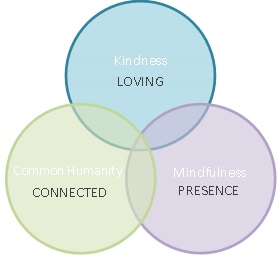 Dr. Neff’s 3 components of self-compassion are also summarised by Michelle Becker as Loving Connected Presence
Dr. Neff’s 3 components of self-compassion are also summarised by Michelle Becker as Loving Connected Presence
Mindfulness is about paying attention to the present moment on purpose, fully aware of our thoughts, feelings, and body, without distraction or judgment. In other words, it is our ability to be with things as they are and with ourselves as we are. Being mindful therefore helps us build our capacity to notice the present and therefore to grow our ability to be self-aware at the moment without judgment. We have a natural tendency to resist what is when things feel uncomfortable and so the role of mindful self-compassion is for us to learn to pause and notice our thoughts and feelings in a moment and accept what is. It has the potential to open our eyes and hearts to what thoughts and feelings are keeping us stuck.
Compassion, meaning “to suffer with”, immediately introduces connection. To embrace Common Humanity is to realize and accept that we are all flawed human beings and that our imperfections and struggles are part of the human condition, a shared human experience. To be human is to be imperfect! Therefore, because we all struggle at times and because we all have an inner critic, we are never alone in our suffering. Remembering the practice of common humanity will allow us, when things feel tough, to become unstuck and to be able to move forward with a greater sense of ease and confidence by simply knowing we’re not alone.
Self-kindness is the idea of treating ourselves with the same kindness, warmth, care, and support you would a dear friend or someone we love. This is a skill we mostly know how to show others but are not so used to showing towards ourselves. Our inner critic can be so loud and can cause us to stay stuck in an unhealthy mental state. We may have the perception that being critical and harsh to ourselves is what we need for things to change and that self-kindness is indulgent. On the contrary, self-kindness is in-fact self-honoring, and essential to reset our mind and energy, to gain clarity and perspective, and to move forward. So, remember to be warm, friendly, useful, calm, and kind to yourself. What you say and how you say it matters.
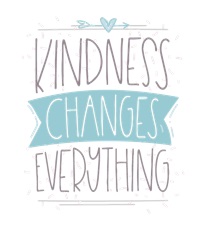 Self-compassion will not dissolve our struggles, but with acknowledging our struggle, remembering that we are not alone, and holding ourselves with kindness, our suffering will be easier to bear.
Self-compassion will not dissolve our struggles, but with acknowledging our struggle, remembering that we are not alone, and holding ourselves with kindness, our suffering will be easier to bear.
Every moment of struggle is worthy of a kind response. – Kirstin Neff
A Coaching Journey
Coaching is a unique journey of self-discovery … one which offers the opportunity to discover and make sense of the world from a personal and a broadened perspective, as thoughts, feelings, and actions are reflected on and processed. There will be points along the way however where a sense of feeling stuck or blocked will be experienced.
Compassion and self-compassion could be the key to unlocking these moments of struggle.
So, how do we grow our compassion and our self-compassion?
To be able to cultivate sustainable compassion for others, it is crucial to first grow our self-compassion muscle. It has been shown that we can show compassion towards others and not ourselves, but that this often leads to burn-out. The Dalai Lama says that for someone to develop genuine compassion for others, first, they must have a basis upon which to cultivate compassion. And that basis is the ability to connect with one’s own feelings and to care for one’s own welfare. Caring for others requires caring for one’s self.
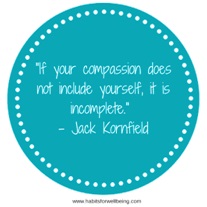 Self-compassion is, therefore, an essential ingredient to include along the coaching journey.
Self-compassion is, therefore, an essential ingredient to include along the coaching journey.
Application of Self-compassion in Coaching
For the coach
Self-compassion is a crucial component for a coach. It plays a role in self-awareness prior, during, and after a session and when necessary enables a coach to bring themselves back into the present moment more easily with warmth and ease. It impacts the energy created around how a coach portrays their profession as well as the energy created in the coaching space itself.
A self-compassionate coach can model compassionate self-talk when things feel hard or when they make a mistake. Self-compassion can also assist a coach in the alleviation of feeling depleted and drained by their work, a concept known as compassion fatigue.
For the client
To bring self-compassion into the coaching journey, there are many misconceptions around the concept that would be useful to first dispel. The client will then be in the best position possible to benefit from the resource of self-compassion.
This table outlines some differences between concepts and highlights some myths associated with self-compassion:
|
Self-compassion is not selfish … |
|
|
Self-compassion is not excessively or exclusively concerned with oneself, disregarding others. In contrast, being self-compassionate helps everyone. |
Self-compassionate people are more able to be intimate, tend to be more giving, and more supportive, and are less angry. The research shows that people with self-compassionate partners are happier. If you can meet a lot of your own emotional needs, you have a lot more to give to others. |
|
Self-compassion is not self-pity … |
|
|
Self-pity is a self-focused emotion to attract attention, where a person feels sorry for themselves: “poor me”. It can lead toa spiral of shame and self-criticism and can worsen personal suffering. |
Self-compassion is “everyone is struggling” which immediately gives a sense of connection and is therefore not focused only on self. It allows one to see the related experiences of self and others without feeling isolated or disconnected. |
|
Self-compassion is different from self-esteem … |
|
|
Self-esteem is about evaluating or comparing yourself to others and is based on your performance. It can therefore fluctuate because it can be affected by many factors. |
Self-compassion is not dependent on anything or anyone outside of ourselves. It is always available! We can feel compassion for ourselves because all human beings deserve compassion and understanding. You may fail, or you may be struggling, but you’re able to be compassionate with wherever you are. |
|
Self-compassion is not self-indulgence … |
|
|
Some think that being kind to yourself is simply giving yourself pleasure. But of course, if giving yourself pleasure means harming yourself or not serving you, then that is not kind, for example eating whatever you want, or not making the changes you need. |
Self-compassion supports and enables us to move forward, to move through the pain. It is linked to healthier behaviors. Those who practice self-compassion are more likely to make good and healthy choices. In fact, research has shown that people with self-compassion take better care of themselves and their health. |
|
Self-compassion is not a weakness … |
|
|
A weakness is something that disempowers and/or drains you. |
Self-compassion is one of the most powerful resources of resilience and strength we have available to us. With reduced fear, anxiety, and self-doubt as a result of a self-compassionate approach, we in fact stand more of a chance of finding our way through a struggle. |
|
Self-compassion does not undermine our motivation … |
|
|
Some think we need harsh self-criticism to get us going to achieve our goals. Self-criticism does work to some extent short-term, but it leads to all sorts of consequences like fear of failure, performance anxiety, and the pressure “to succeed or else”, and so it in fact often undermines our ability to succeed and can have the opposite effect to motivation. |
Self-compassion motivates us through a sense of encouragement and support, taking the approach of compassionate self-talk such as: “I believe in you”. With warmth towards ourselves, we can say: “Yes, I’ve failed, but what can I learn from this, how do I do it differently, how do I make it better, …?” We are more likely to take responsibility for our mistakes because a self-compassionate space feels safe to admit our faults. Those with a self-compassionate mindset are therefore less afraid to fail and more likely to try again. |
Part of the client’s journey is to learn to give themselves the tenderness and care they need, especially when things get tough.
Some of the benefits of having a self-compassionate mind state when things are tough are:
Ultimately self-compassion is about doing for ourselves what is best for us, choosing to act in the world with care. Dr. Kristin Neff talks about the Yin and Yang of self-compassion and how important it is that both are nurtured. The tender Yin refers to the warmth and kindness we must offer ourselves – remembering that what we say and how we say it matters – and the fierce Yangrefers to taking action when necessary, which may mean things like deciding to make a change, putting a boundary in place or saying yes or saying no.
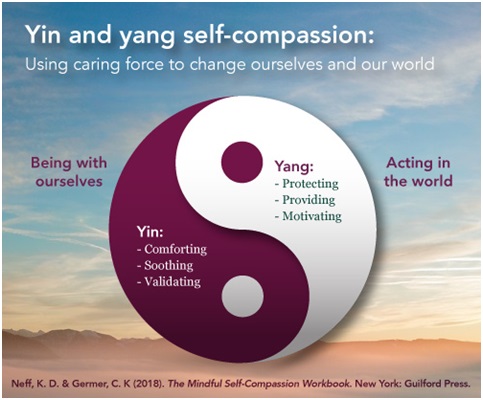 The most important foundation to offer ourselves on which to build a practice of self-compassion is a foundation of emotional safety, of being aware of our needs, and of knowing our core values. To then build on this foundation as we journey, there are several practical exercises and meditations as well as some ideas – both big and small – of ways to cultivate or show compassion that can be found online to support and enhance the learning of this practice.
The most important foundation to offer ourselves on which to build a practice of self-compassion is a foundation of emotional safety, of being aware of our needs, and of knowing our core values. To then build on this foundation as we journey, there are several practical exercises and meditations as well as some ideas – both big and small – of ways to cultivate or show compassion that can be found online to support and enhance the learning of this practice.
These can be introduced and included in coaching sessions along the journey. Also, and importantly, to sustain this practice of self-compassion, we are encouraged to regularly remind our hearts to practice gratitude and feel joy.
Inclosing, a gentle reminder for us all …because we are human, our inner-critic will continue to visit us without fail. I, therefore, leave you with an invitation to welcome it in with warmth, to consider it a guide rather than an enemy, and to open your heart to appreciate its wisdom and its presence. This is what begins to make shifting our inner dialogue to compassionate self-talk possible, enabling us to find our own voice of compassion. Self-compassion awakens the energy of love, so when things are feeling tough, try something like this self-compassion mantra written by Dr. Neff to support this shift in dialogue and to bring love. Anything is possible with love.
“I am having a really hard time right now.
Everyone feels this way sometimes.
May I be kind to me at this moment?
May I give me the compassion I need.”
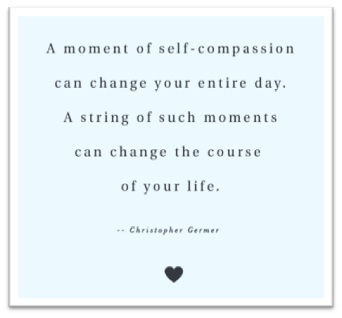
References
https://www.selfcompassioncoaching.com/
https://www.selfcompassioncoaching.com/self-compassion.html
https://www.youtube.com/watch?v=rG09J7a40hc&feature=emb_rel_end
https://www.youtube.com/watch?v=rUMF5R7DoOA&lc=UgiEyD_vdyftEXgCoAEC
https://www.youtube.com/watch?v=HoqSvlakeSQ